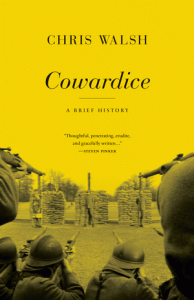From the Publisher’s Page (Princeton University Press):
Coward. It’s a grave insult, likely to provoke anger, shame, even violence. But what exactly is cowardice? When terrorists are called cowards, does it mean the same as when the term is applied to soldiers? And what, if anything, does cowardice have to do with the rest of us? Bringing together sources from court-martial cases to literary and film classics such as Dante’s Inferno, The Red Badge of Courage, and The Thin Red Line, Cowardice recounts the great harm that both cowards and the fear of seeming cowardly have done, and traces the idea of cowardice’s power to its evolutionary roots. But Chris Walsh also shows that this power has faded, most dramatically on the battlefield. Misconduct that earlier might have been punished as cowardice has more recently often been treated medically, as an adverse reaction to trauma, and Walsh explores a parallel therapeutic shift that reaches beyond war, into the realms of politics, crime, philosophy, religion, and love.
Yet, as Walsh indicates, the therapeutic has not altogether triumphed—contempt for cowardice endures, and he argues that such contempt can be a good thing. Courage attracts much more of our attention, but rigorously understanding cowardice may be more morally useful, for it requires us to think critically about our duties and our fears, and it helps us to act ethically when fear and duty conflict.
Richly illustrated and filled with fascinating stories and insights, Cowardice is the first sustained analysis of a neglected but profound and pervasive feature of human experience.
“Walsh’s well-written and wide-ranging study of cowardice offers some valuable insights into one of the military’s–and society’s–last taboos.”—Australian
“In Cowardice, Chris Walsh, associate director of the College of Arts and Sciences Writing Program at Boston University, provides a fresh and fascinating examination of the use of the term on–and off–the primal theater of cowardice, the battlefield. Drawing on research in evolutionary biology as well as an informed interpretation of American history and literature, Walsh analyzes the relationship between courage and cowardice, the tendency to characterize men and not women as cowards, and the distinction between physical and moral cowardice. Most important, Walsh argues, provocatively and persuasively, that over the past century the idea of cowardice has faded in significance, especially in military settings, and reappeared with somewhat different connotations.”–Glenn Altschuler, Psychology Today
“Given the pervasiveness of this feeling in our culture, it’s somewhat astonishing that Walsh’s book appears to be the only full-length study of cowardice in existence. Fortunately, he’s packed a tremendous amount into 190 pages. The book offers a brisk survey of how the word has infiltrated our cultural notions of valor, and draws on authors ranging from Aristophanes to Dante to Stephen Crane, and philosophers from Confucius to Kierkegaard.”–Steve Almond, Salon
“[A] lively commentary on the concept of cowardice. . . . Chris Walsh deftly unpicks the competing moral codes underpinning notions of cowardice and its opposite, courage.”–Joanna Bourke, Literary Review
Introduction 1
Chapter 1 Profiles in Cowardice: A Shadow History of the Home of the Brave 23
Chapter 2 Of Arms and Men 45
Chapter 3 The Ways of Excessive Fear 77
Chapter 4 Duty-Bound 100
Chapter 5 The Rise of the Therapeutic 131
Chapter 6 So Long a File: Cowardice Away from War 165
Acknowledgments 195
Notes 199
Bibliography 249
Illustration Credits 277
Index 281
